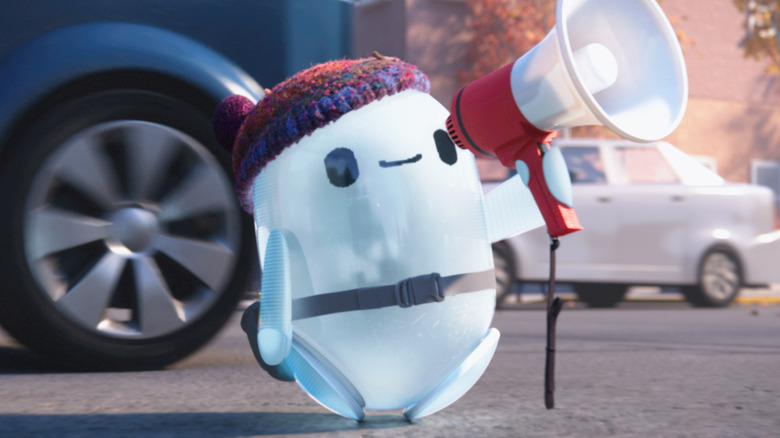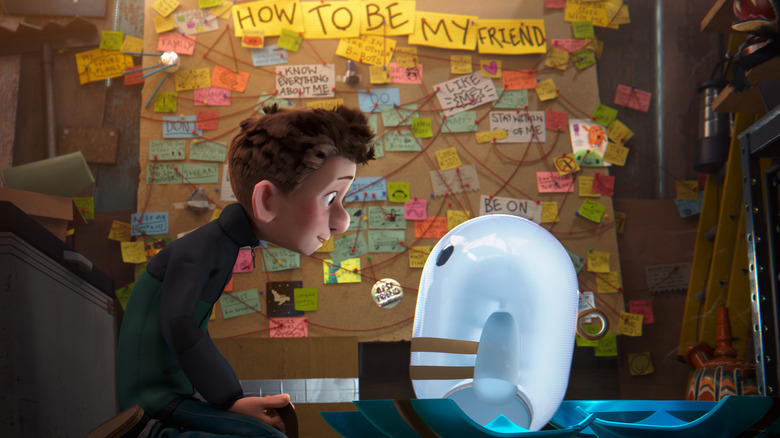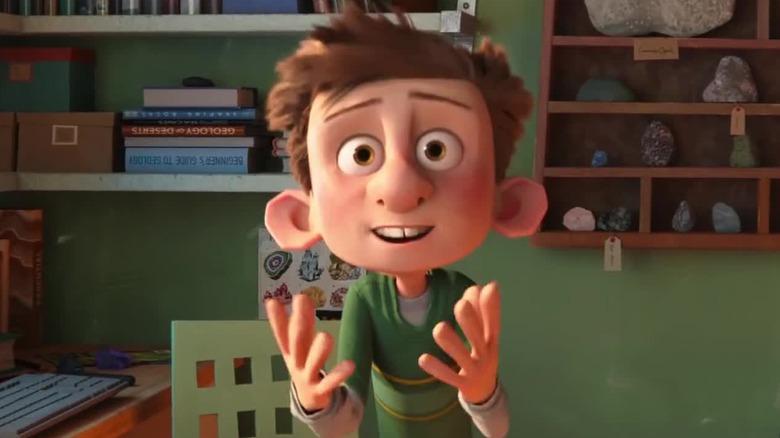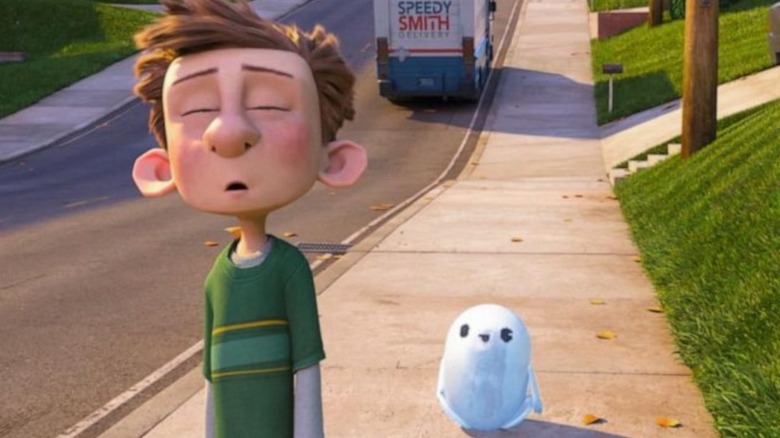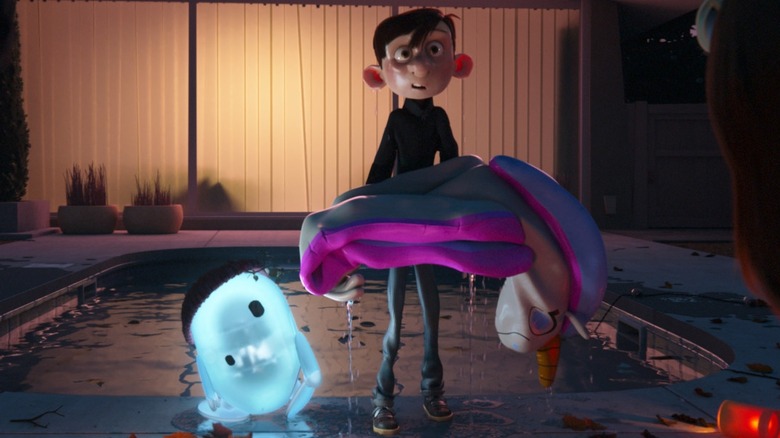How Ron's Gone Wrong Directors Made A Film About Connection While Disconnected [Interview]
"Ron's Gone Wrong," from 20th Century Studios and Locksmith Animation, tells the story of Barney and his robotic B-bot companion, Ron. Ron is part of a brand new product line of small, social media connected bots intended to be your "best friend out of the box," but there's a catch: Ron's broken. Unable to connect to the cloud, he's forced to learn how to befriend Barney and build his own personality the old-fashioned way: by spending time together.
It's a charming film with some stellar voice acting talent for characters Barney Pudowski (Jack Dylan Grazer), Ron (Zach Galifianakis), Donka Pudowski (Olivia Colman), and Graham Pudowski (Ed Helms), and one that survived the complex process of pandemic disruption to become a modern celebration of the importance of connection.
I chatted with co-directors Jean-Phillippe Vine and Octavio E. Rodriguez about the process of making "Ron's Gone Wrong," why the film is so important to them, and more.
"I love having the Conversation when you walk away"
Well, first of all, it's so lovely to get to talk to both of you. I really enjoyed the film. I thought it was very, very funny and very charming. The first question I had for you both is, why is this project important to you?
Jean-Philippe: This project originated from Sarah Smith and Peter Baynham, who are brilliant comedy writers. The motive behind it was looking at what our children's relationships are like now that they're kind of all filtered through a social media network. That resonated with me as a parent when I heard the pitch. The other thing is this kind of adventure story that, to me, felt like we could create something that felt Spielbergian and have that real coming-of-age experiential feeling to it. And lastly for me was to come back to London and make a big animated feature in my home country, which was a real cool challenge.
Octavio: For me, it was all those things, and I love having 'the conversation' when you walk away. It felt that was what we were doing, with technology and [with] being a parent as well, how they're dealing with that, having those conversations. So it was that in itself, and [that] being able to direct and tell a story is something that we all have been wanting to do for a while, and working with Jean-Philippe. We had worked together at Pixar, it was just a great opportunity.
That's wonderful that you were able to tie in this tradition of working together. I only see the end product of course, but it feels like a seamless collaboration.
Octavio: Oh, it does, it does. We always talk about this, which is very surreal right now, Jeff ... We used to hang out at Pixar and have coffee and exchange stories all day long and go, 'Yeah, that would be great. Oh, you know what? You could do this, you can do that.' And it's just crazy that we ended up directing a film and it's out in the world. It's freaking nuts.
"How do you inspire people?"
It's so interesting to me too, because it's a story about the hardship of being isolated and the importance of friendship, but it was filmed while the team was isolated and working remotely. What was that like for you both and how did it shape the story or your approach to it?
Jean-Philippe: We had to switch to remote working when we were about a third of the way through animation... and ironically, I was one of the first to go down with COVID. So I had to leave the building and I was stressed, because like Octavio, I walk around every department. I was like, 'Oh man, I'm like the monkey from Outbreak.' I just spread it around the building. But our IT and production departments were heroic in their effort to get us up and running so that we could all work in our pajamas in our bedrooms... but it was really tough because we were in Zoom calls from 9:00 AM to 7:00 PM. That sense of chemistry, of sharing ideas, animators going from one desk to another [ ... ] It was really critical that we'd spent half of the production together in the office and we built that relationship. We built a history with each other, and we could kind of agree on the direction of the movie as clearly as possible.
Octavio: Yeah. It was the combo, as Jean-Philippe said, to have that bond previously, working with each other at the studio... and then after that it's the tech support. And again, this is a startup company that created this amazing movie. And everybody came together to actually make it work, which is amazing. And we're very fortunate to have the talent that we had.
On another note of just being isolated... It was interesting. It made you have to push to a different level, I think just in general, like how do you inspire people? How do you have interactions? Things that you would do as Jean-Philippe's saying, going to the cubicles, you just couldn't do that... 'Hey, you got a moment?' You had to figure out when you're interacting in Zoom. It's like, how do I inspire? What's going on in the day? I mean, what is what's actually happening? So it was a lot of shifts and pivots, but I think we try to find ways. I remember trying to sketch things, and I used Photoshop, but then I would go, 'You know what? I mean, I'll used a post-it and Sharpie and let's just do it and see what happens.' [It's all] really hard, but we got to find a way. I think it's an unspoken rule about trying to make a good film.
"With Ron and Barney, they're basically building a friendship where there's no algorithm"
Tell me a little about your collaboration process with Sarah.
Jean-Philippe: Sarah is one of the writers as well as the director on this project, and she is kind of the keeper of the story in so many ways. And she's a master storyteller. We kind of split ourselves across departments and then we would come back, we'd argue a lot. But Sarah's instincts are super strong in terms of storytelling, and it was important that she was forging that path. At the same time, we're feisty creatives, and we wanted to fight, we've all tried to fight for the best movie. In the end, it can't all be three opinions. We have to, in the end, distill it down. And actually, sometimes it's great to have an editor who can kind of go, 'This is the right way we should do it.' Props to Sarah, in terms of holding the reins of story whilst we were in the trenches of animation and layout.
Love it.
Octavio: Just to add to [that] for my experience, I believe we were just at a place where this is a great opportunity for growth and also to have opinions and just to flex the muscles of what is your voice, your film voice. So it's been pretty amazing. And for us, I'm accustomed to [ ... ] at Pixar, it is all about collaboration. It's a constant arguing of ideas. And you all kind of know we're just trying to make the best film at the end of the day.
I also know that thematically, you both mentioned being parents, the film hits really hard about our increasing over-reliance on technology, especially socially. And I was just wondering to get your take on that theme and how it relates to the film and what it means to you.
Jean-Philippe: At its most simple level we really wanted to kind of explore, to lay out the foundation of what is a real friendship and what is a positive friendship. Because of the way an algorithm works or the way an AI works of connecting children with other children that like the same stuff... it's a noble impulse at the beginning of the movie, but actually it's kind of illustrating that you get kind of tribalized when you get stuck in your own little pocket, you're not exposed to things that challenge you, or to stories that can enrich your life, or to characters or people that come enrich or deep in your life. So with Ron and Barney, they're basically building a friendship where there's no algorithm, there's no software... and he's an idiot, the robot's an idiot. But what we wanted to do is like... 'okay, make that the starting point of their friendship and then watch it develop.' And it's that messiness of it that is actually the best part of it, so that's kind of what we're trying to say.
"[Barney] has this narrative tape in his head about how the world sees him"
I know you're experienced story artists... what was your storyboarding process like, and what was the biggest challenge for you both in that realm?
Octavio: I feel like the biggest thing, and we always talk about it, for me it's always trying to find the heart of what is in every sequence and every beat and every scene. What is the intent of the scene? And I think that was one of the iterations that we went through a lot of when we were doing the storyboarding. I would always ask the team to go, 'What are you trying to say in these moments?'
We were going through it over and over again, but it's getting that idea of this kid, who's on this coming-of-age story with tech, and trying to find ways that could be funny [in] how he interacts with that. It wasn't an easy task. Because as a parent with kids ... I love this moment with Barney where he just has this narrative tape in his head about how the world sees him. And he believes it. And that's a lot of times how kids kind of see themselves, like 'I'm the only one going through this,' when actually that's not really true.
Jean-Philippe: Everyone is, yeah.
Octavio: So I think in storyboarding, it's those moments that you're looking for, those beats. It's like I always say, if you feel something, if you smile, you're getting close.
Jean-Philippe: Also, we're a startup. So we'd come from a department of 50 plus story-boarders at Pixar, and then we're coming to do a startup in the UK where there's a bit less of that animation filmmaking tradition of storyboarding, so [there's] a lot of training and a lot of bringing up talent as well. So it's good. It's growing in Europe, as a discipline, which is really cool to see.
Octavio: Yes, which was like the whole idea. We did a film school theory, which was amazing, letting people just kind of talk about their films and breaking down stuff. I'm glad you brought that up, Jean-Philippe. It was amazing, because we really wanted people to feel inspired and bring something different for the sequences.
